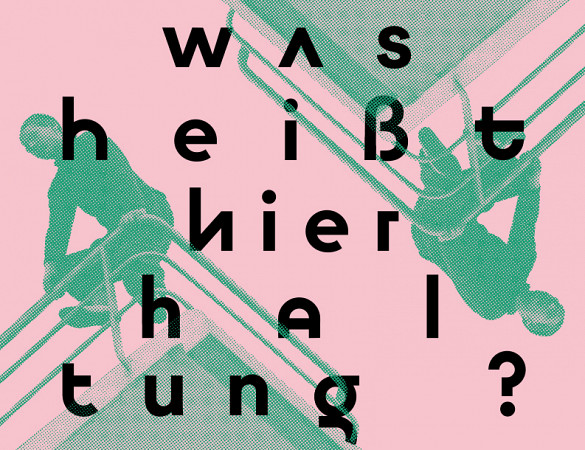
Taking a Stand?
Debating the Bauhaus and Modernism
An international symposium of the Bauhaus-Archiv / Museum für Gestaltung in the context of original bauhaus
29/30 November 2019, Berlinische Galerie
The symposium was concerned on a number of levels with the idea of taking a stand. It first considered the attitude of Bauhaus exponents and modernist architects living as émigrés or in exile or in divided post-war Germany, working in conflict situations and areas of tension. To what extent are their ideas regarding the planning and construction of buildings for a ›new world‹ changing in other political, economic and social contexts? Questions relating to attitude and standpoint encompass learning processes, too, which have lost none of their relevance in light of the current challenge to acknowledge and meet local needs in a globalised world.
The question of stands adopted also impinges on our present-day relationship to the Bauhaus and on our cultural self-awareness. The attitude in the past towards the Bauhaus and Bauhaus pedagogy in Sweden, Latin America and China, which makes itself felt in processes of exchange, translation and transformation, has shown the Bauhaus to be a transnational and transcultural network of relationships featuring asymmetrical power structures. How does this realisation – running counter to the idea of Bauhaus as a »major German export« – affect the way we deal with the Bauhaus? And how do our principles and standards come to bear?
Attitudes inform the processes of reception and suppression in the writing of history and in remembrance politics. Which self-image or self-awareness, which world view and which projections into the future underpin these attitudes? And how much scope do we have for new discoveries, peripheral perspectives and transformation processes?
The event brought together international academics and students from the Paula Fürst and Nelson Mandela Schools in a non-public workshop as part of the Bauhaus Agents Programme and invited the students to participate in the opening evening and discussion.
With simultaneous interpretation in German / English
Concept and coordination: Andrea Bärnreuther, Bauhaus-Archiv / Museum für Gestaltung
Full programme (PDF)
The event was supported by the Federal Agency for Civic Education and the »original bauhaus« exhibition project. The centenary exhibition of the Bauhaus-Archiv / Museum für Gestaltung, Berlin, in cooperation with the Berlinische Galerie is supported by the Berlin Senate Department for Culture and Europe and the German Federal Cultural Foundation.
PROGRAMME
29th November, 6 pm - 8.30 pm
Welcome address
Thomas Köhler, Director, Berlinische Galerie
Annemarie Jaeggi, Director, Bauhaus Archiv / Museum für Gestaltung
Introductory words
Andrea Bärnreuther, research associate, Bauhaus-Archiv / Museum für Gestaltung
Opening address
Olaf Scholz, Deputy Federal Chancellor, Federal Minister of Finance
Keynote speech
Winfried Nerdinger, Director, Fine Arts Department, Bayerische Akademie der Schönen Künste; Professor Emeritus of Excellence for History of Architecture and Structural Design, TU München
Conversation between Winfried Nerdinger and Olaf Scholz and discussion with the audience
Moderator: Anh-Linh Ngo, architect, co-editor of ARCH+, co-founder of the initiative “projekt bauhaus”
Get-together
30th November, 10 am - 8 pm
9 am - 10 am
Registration
10 am
Welcome address
Birgitta Müller-Brandeck, Director of Administration, Berlinische Galerie
Annemarie Jaeggi, Director, Bauhaus Archive / Museum für Gestaltung
Introduction
Andrea Bärnreuther, research associate, Bauhaus Archive / Museum für Gestaltung
Section I: Planning and Building for a ‘New World’?
Conflict situations, areas of tension, learning processes
Moderator: Titia Rixt Hoekstra, Lecturer, Creative Technology, University of Twente,
Enschede
Planning for “the New World”: Hannes Meyer in the Soviet Union and Mexico
Raquel Franklin, Head of Theory of Architecture Department, Universidad Anáhuac México
Richard Paulick – From Bauhaus to the Stalinallee and back
Ulrich Hartung, architecture historian, Berlin
Formalism and the Real: Bruno Taut’s translation of Neues Bauen in exile
Paola Ardizzola, Assistant Professor, Architecture & Interior Design Department, Architec-ture Program, LAU – Lebanese American University, Beirut Campus
Hannes Meyer in Mexico: Revolution, Modernity, and Critical Regionalism
Ryan Fred Long, Associate Professor of Spanish, University of Maryland
12.40 pm - 2 pm
Lunch
2 pm - 4.30 pm
Section II: Bauhaus and Bauhaus pedagogy in Sweden, Latin America and China. Processes of exchange, translation and transformation in the political space
Moderator: Joaquín Medina Warmburg, Professor of History of Architecture and Construction, KIT-Fakultät für Architektur, Karlsruhe
Reception, Exile and Folkhemmet – Sweden and the Bauhaus
Atli Magnus Seelow, Associate Professor for Theory and History of Architecture, Chalmers University of Technology
Born from the periphery - Gui Bonsiepe’s contribution to a symbolic production of design within the cultural-political context of Salvador Allende’s Chile
Susanne Neubauer, freelance art historian and guest researcher at the Universidade de Brasilia (with co-author Marcelo Mari, Adjunct Professor, Instituto de Artes Visuais, Universidade de Brasilia)
The “Integral Architect”. Co-op in Chile
Daniel Maulen de los Reyes, researcher in the interface between art, science, technology and society specializing in Chile and South America
A Double Agency of China’s Bauhaus: Pedagogical Modernities and Problematics at Tongji & Tsinghua University
Chin-Wei Chang, PhD student in Architectural History & Theory, The Bartlett School of
Architecture, University College London
4.30 pm - 5 pm
Coffee break
5 pm - 7 pm
Section III: History writing and remembrance politics. Processes of reception and suppression
Moderator: Doreen Mende, Associate Professor and Head of CCC Research Masters and PhD Forum at the Haute École d’Art et de Design (HEAD), Geneva
The Myth of the Bauhaus City Tel Aviv
Philipp Oswalt, Professor for Design and Architecture Theory, Universität Kassel
The Bauhaus and the labour movement in Palestine – Shmuel Mestechkin and Munio Gitai (Weinraub)
Ronny Schüler, research associate and PhD student, Chair in Theory and History of Modern Architecture, Bauhaus-Universität Weimar
Damnatio memoriae – Mart Stam. A case study
Simone Hain, architecture historian
7 pm - 7.20 pm
Break
7.20 pm – 8 pm
Closing discussion: What remains to be done
Moderator: Annemarie Jaeggi
With Titia Rixt Hoekstra, Joaquìn Medina Warmburg, Doreen Mende
Closing words
Andrea Bärnreuther
